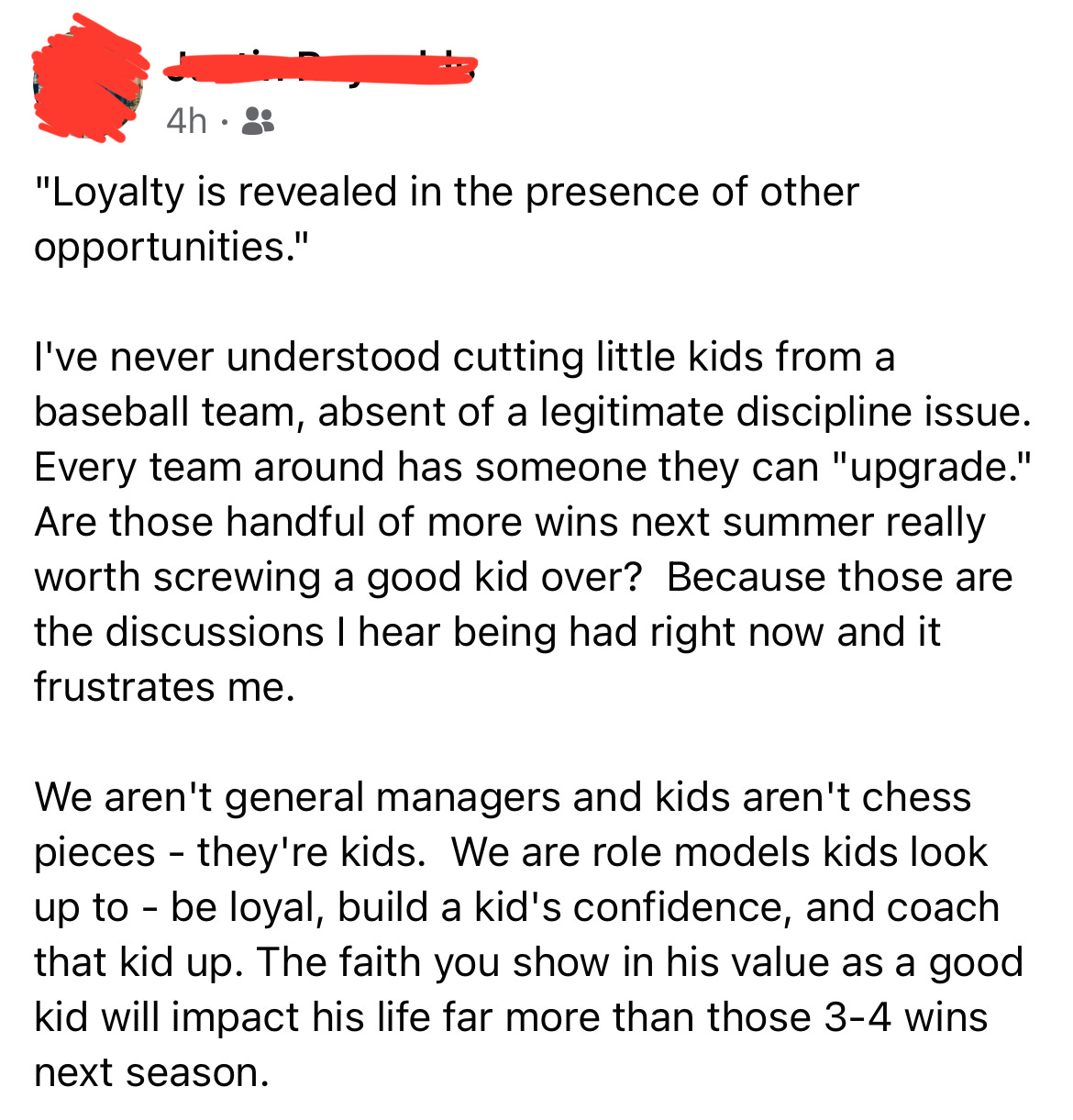Hello parents and coaches!
It’s been a few weeks, but I’m back and ready with some great stuff.
I shared a Facebook post a couple weeks ago teasing this topic. I had more comments than usual, so I knew it would be 🔥.
This week I’m going to gain or lose subscribers (probably some of both) - and that’s okay. I’m not here to make friends (although it is a perk), rather to share my experience and positively impact kids and families through youth baseball.
(Listen above or through your favorite podcast app, or continue reading below.)
Everyone is Thinking About Next Season
As the current season winds down, coaches and parents get to work figuring out what next year will look like. It happens earlier and earlier every year.
Everyone has an angle.
Many coaches are looking to “upgrade” their team.
Some parents just want to win more.
Some parents aren’t happy with their son’s playing time or position, so they’re looking to see which area teams will have openings.
Here’s the thing…None of those things are bad on the surface.
I mean I’m not here to say you shouldn’t want to be better, win more games, and do what’s best for your kid(s).
But what about the cost? What about the collateral damage? What about the big, long term picture?
And is it even worth it?
Here’s a screenshot of the Facebook post I came across.
Now let’s unpack all of that and talk about what nobody wants to hear.
The Reality
I know some guys who have played and coached at really high levels.
Off the top of my head, we had an 11 year big league vet on the show, my brother was a first round draft pick, and then just the other day a kid who played on our 9U team 9 years ago was taken in almost the same spot in the draft (I’ll talk about him and that season more below).
All those guys got (or will get) big money relative to what most of us will ever make - especially playing a sport.
But here’s the thing - that’s not realistic for 99% of us. It’s just not.
It doesn’t mean we shouldn’t do our best and help our kids succeed, but it means we shouldn’t treat youth baseball like we’re playing for a World Series and our career is on the line.
In fact, what’s on the line is much much more important - the future of our kids.
The Root of the Madness
There are two main reasons daddy’s become youth baseball General Managers and parents jockey to find the ‘best team’ for their kid.
For those that may not know, a General Manager in Major League Baseball is the person responsible for building the best team possible, making trades, drafting and cutting players, and ultimately is held accountable for an organization’s success or failure.
Now, if you find this part offensive, send me an email. But I’ve been both of these, so I can say it. And if it hurts, it’s probably true.
For coaches, they just want to win. Period. I don’t know how else to say it.
Sure, most coaches I come across are good people. They care for the kids. They want them to be as successful as possible. But the desire to win and be the best rises above all else. This is true even for most that would say it’s not.
For parents, we can’t stand for our children to fail, be uncomfortable, or face adversity, and it’s natural for us to want to intervene.
Unfortunately, that’s not really how life is going to be. These kids have to learn how to lose, how to struggle, how to sit the bench, how to be good teammates, and how to not play the position they want to play.
Coaches
The post above is accurate. Many (entirely more than you might think) youth coaches act as a General Manager and use their players as chess pieces.
What’s wild, is most off-season “upgrades” only yield a few more wins each season.
A few. A FEW?! Say that out loud. You’re going to cut one or two kids so you can win 5 more games next year? Trust me, I’ve been there before. But if 5 more games is what you’re trying to accomplish, you should step back and just be a parent.
What in the world are we doing?!
We fail to set goals, develop players, actually teach them how to be better, and then when one or two of them doesn’t meet our ‘performance standards’ we cut them for someone better.
Parents
Pump the breaks on changing the environment so your son can be successful instead of preparing them to adapt to and deal with the environment they find themselves in.
Kids are leaving teams left and right because they aren’t playing the right position, or the team didn’t win enough games or rings.
There are legitimate reasons to leave a team (and I’ll get into it below), but avoiding failure and adversity are not two of them.
Back to the Basics
We have to get back to the basics of what we’re trying to do each week on the ball field, and let that guide us in all that we do related to baseball.
Remember, I’m focused on younger guys - ages 6 - 12.
If you haven’t, go back and read one of my very firsts posts (or listen to it here), and I talk about what I believe we should be focused on.
As youth coaches and parents we should be focused on three things, and I personally don’t think it should even be a conversation:
Have fun
Get better
Learn life lessons
If you disagree, email me. I’d like to hear what would go ahead of those three things for a 9 year old baseball player.
So back to what I said above. If those are our goals, why would we look to “upgrade” one of our players to get a few more wins?
Why would we look to jump teams that we are otherwise happy with to get a couple more rings or trophies.
What to do Instead
This is a tough one to tackle because every situation is different. There are teams with 50 wins last year trying to eek out a few more, and there are teams with 50 losses looking to just have a chance (and even more somewhere in the middle).
Even with the disparity of teams and talent, I believe we as coaches and parents have a duty, a responsibility, to get back to the basics of what’s really important and let that guide how we act, how we coach, how we parent, how we win, and how we lose.
Coaches
It’s hard, but you must suppress the desire to put winning above all else. This clouds judgement, decision making, and how you coach your team.
You begin to make decisions that favor short term gain as opposed to long term gain for the players and the team.
An example of this is over-pitching your top 2 or 3 pitchers. You do this because you don’t think you have an opportunity to win otherwise. So the short term potential upside gets in the way and you stick with your top few guys.
The irony is, you may win that one game, but the long term downside is far greater to both those individual pitchers, all the other kids, and your team as a whole.
Those guys that you over-pitch are more likely to have arm problems as they get older. The kids you never give an opportunity to are going to be behind, and your team is actually NOT going to be as good because you haven’t developed the talent and they’re not going to be as deep as they could be.
Another example is moving guys around to different positions. The best teams NOW are the teams who play their best players at the most important positions. The best teams in 2 and 3 years are the teams who move guys around NOW and develop baseball players instead of shortstops, first basemen, and outfielders.
But we don’t think like that because we become a General Manager and want to win now, now, and now. So we make poor choices.
Parents
Same thing for parents.
We look at what might be the most beneficial for our kid in the moment.
We look for what’s going to keep them from experiencing adversity.
We look for ways to set them up for the most comfortable experience.
We have to let our kids learn to figure some things out for themselves. It’s never too young to start teaching them these life lessons.
We also have to be careful not to place the entirety of our kid’s worth in how they perform on the ball field. Your kid might just not be very good. Your kid who is good today at 9 might turn out to just not be very good when he gets to middle school.
And that’s okay. But we can’t tie their value and their worth to how they perform. I don’t think most of us do this intentionally, but we are doing it without even realizing it. If they feel that from us, we’re setting us and them up for a very disappointing and unfulfilled childhood.
Legitimate Reasons
Just to be clear, and to avoid some hate mail, there are a few things that I think qualify as legitimate reasons for coaches to part ways with a player or for parents to find another team for their son.
The details of this are for another episode, but could include (but not limited to):
Behavior issues
Commitment issues
Non-baseball related issues
Goals and objective differences
These, and others, could be legitimate reasons for coaches and families to part ways with one another, but it should rarely (or never) be just because we want a few more wins or my kid is facing adversity.
Let’s Do Better
At the end of the day, we can only control ourselves and how we handle these situations.
As the 2021 summer season comes to a close and we all look towards next season, I challenge you to go back and write down your WHY. Revisit your family’s goals for youth baseball in whatever situation you’re in.
I challenge you to keep those goals at the forefront of everything you do as a coach, or as a parent.
If this message hits home to you, don’t let it define you.
I too was this parent or coach at one time, and it took me doing it the wrong way to change and try to do it right.
The time we have with our kids playing a game we all love is short, so let’s not waste it. Do it right.
Have fun. Get better. And use baseball to prepare your team (or son) for life!
🚨 For more content like this, subscribe for free here! 🚨
Thanks for reading (or listening) and being a part of the Elbow Up community. Consider sharing this post and podcast with a friend, other parents and coaches, or even your entire team!














Share this post